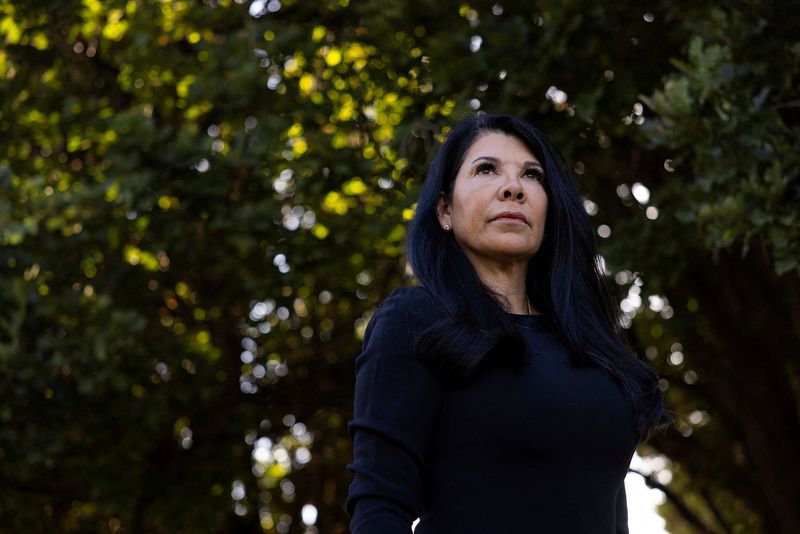By Laura Gottesdiener and Michael Martina
WASHINGTON (Reuters) -A group of families whose loved ones died of fentanyl overdoses filed a petition with the office of U.S. Trade Representative Katherine Tai on Thursday, requesting a probe into China's alleged role in fueling the U.S. synthetic opioid crisis.
The petition was filed under Section 301 of the Trade Act of 1974, a statute that allows the U.S. to impose sanctions on foreign countries that violate trade agreements or hurt U.S. commerce. The families are seeking trade countermeasures that include tariffs of at least $50 billion on Chinese merchandise.
China is the world's leading chemical producer. The petition alleges that China's government has failed to crack down on exports of precursors used by traffickers to manufacture illicit fentanyl, inaction that has cost the U.S. trillions of dollars in lost productivity, higher health care costs, increased law enforcement spending, and loss of life due to fatal overdoses from the synthetic drug.
A 2022 analysis by the congressional Joint Economic Committee estimated that the opioid crisis cost the U.S. nearly $1.5 trillion in 2020.
Overdoses from synthetic opioids killed nearly 75,000 people in the U.S. last year alone and are approaching a half-million fatalities over the past decade, government figures show.
Section 301 empowers the United States Trade Representative (USTR) to investigate and defend the U.S. against foreign trade practices, including action that "burdens or restricts" U.S. commerce. Any interested person can file a petition, and USTR must decide within 45 days whether to initiate a probe.
A USTR spokesperson said the agency is reviewing the petition.
Nazak Nikakhtar, an attorney at the Wiley Rein law firm who filed the petition on behalf of the families, told Reuters the issue was "squarely" within USTR's legal authority given the debilitating effects of fentanyl addiction on the American workforce and the U.S. economy.
"China responds to economic pressure. We're going to put economic pressure on China," said Nikakhtar, a former Commerce Department official.
China's embassy in Washington did not respond immediately to a request for comment.
Reuters investigations this year have revealed that Chinese chemical companies openly sell fentanyl-making ingredients on the internet and ship them to the U.S. with ease, thanks, in part, to an obscure U.S. trade regulation, known as de minimis, which allows low-value packages to enter the U.S. duty free and with minimal paperwork and inspections.
The petition recommends a variety of trade countermeasures, including imposing tariffs of at least $50 billion on Chinese goods and services, and banning Chinese shipments from entering the U.S. via de minimis.
Andrea Thomas, one of the plaintiffs on the petition, said she hoped the trade action would save lives by forcing China to stop exporting fentanyl precursor chemicals.
"There's been so much devastation to our families," said Thomas, whose daughter died in 2018 after taking a fentanyl-laced pill she thought was a painkiller.
China says it has some of the strictest drug laws in the world, and that the U.S. needs to curb narcotics demand at home.
The petition comes just weeks ahead of the U.S. presidential election, where fentanyl has emerged as a key issue.
Former President Donald Trump frequently rails against the fentanyl crisis, even though synthetic opioid deaths more than doubled under his administration. The Republican candidate has vowed to pursue harsh measures, including possible military action against Mexican cartels.
Vice President Kamala Harris, his Democratic challenger, has promised to target the global supply chain and stop finished fentanyl from entering the U.S. from Mexico, where drug cartels operate manufacturing labs.
While U.S. overdose deaths remain high, the pace of fatalities appears to be slackening, recent government data show. The administration of President Joe Biden has credited its harm reduction initiatives and law enforcement efforts.
The White House has also characterized recently revived counternarcotics cooperation with China as a bright spot in tense relations between the geopolitical rivals. But some U.S. lawmakers have called for more aggressive measures to pressure Beijing to act.
The USTR petition is an unusual avenue for families to seek redress for the fentanyl crisis, said Jeff Moon, a former Assistant U.S. Trade Representative for China Affairs who now advises businesses on China issues.
At issue, he said, is whether American commerce had been unjustifiably impeded by Chinese policies related to the export of fentanyl precursors, as the petition argues.
The filing "appears to be more of an activist effort than a trade action," he said. "If Trump is elected, his preferred remedy is tariffs, so maybe they're appealing to that."
As president, Trump showed an affinity for tariffs to address trade imbalances with China. His administration expanded the use of Section 301, ultimately kicking off a trade war with Beijing. His administration cited China's intellectual property practices and industrial policies as discriminatory burdens to U.S. commerce.
He has said that if he retakes the White House, he would consider tariffs to pressure countries, including China, on issues not directly related to trade, such as immigration.
U.S. labor unions in March filed a separate petition requesting that USTR investigate China's alleged unfair policies and practices in the maritime logistics and shipbuilding sectors.

USTR launched a probe in that case that is ongoing.
China said at the time it was "firmly opposed" to that investigation, describing it as "contrary to economic common sense" and based on false allegations.